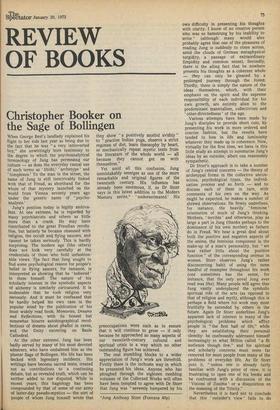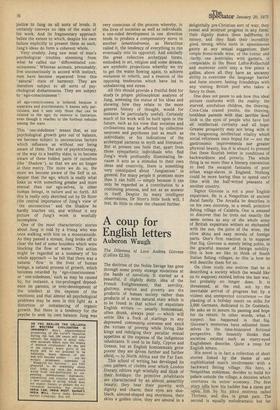REVIEW OF BOOKS
Christopher Booker on the Sage of Bollingen
When George Best's landlady explained his flight to her side last year as being due to the fact that he was "a very introverted boy," she unwittingly bore testimony to the degree to which the psychoanalytical terminology of Jung has permeated our culture — as does the everyday casual use of such terms as 'libido,' archetype ' and 'complexes.' To the man in the street, the name of Jung is still inextricably linked With that of Freud, as shorthand for the whole of that mystery launched on the world from Vienna seventy years ago under the generic name of 'psychoanalysis.'
Jung's position today is highly ambivalent. At one extreme, he is regarded by many psychiatrists and others as little More than a crank. He may have contributed to the great Freudian revolution, but latterly he became obsessed with religion, the occult and flying saucers, and cannot be taken seriously. This is hardly surprising. The modern age (like others) does not look very carefully at the credentials of those who hold unfashionable views. The fact that Jung sought to find some psychological reason for people's belief in flying saucers, for instance, is interpreted as showing that he ' believed ' in them himself. The nature of his scholarly interest in the symbolic aspects of alchemy is similarly caricatured. It is Undeniable that he took religion very seriously. And it must be confessed that he hardly helped his own case in the popular mind by the publication of his most widely read book, Memories, Dreams and Reflections, with its honest but somewhat bizarre autobiographical recollections of dreams about phalloi in caves, and the Deity excreting on Basle Cathedral.
At the other extreme, Jung has been badly served by many of his most devoted admirers, who have embalmed him as the plaster Sage of Bollingen. His life has been decked with legendary incidents. His writings have become sacred texts, treated not as contributions to a continuing debate, but as revealed truth, which can be neither added to nor disputed. While in recent years, this hagiology has been compounded by that of some of our army of latter-day pseudo-mystics — the sort of people of whom Jung himself wrote that they show "a positively morbid avidity" to "practise Indian yoga, observe a strict regimen of diet, learn theosophy by heart, or mechanically repeat mystic texts from the literature of the whole world — all because they cannot get on with themselves."
Yet amid all this confusion, Jung unmistakably emerges as one of the more remarkable and original figures of the twentieth century. His influence has already been enormous, if, as Dr Storr says in this latest addition to the Modern Masters series,'" underestimated.' His preoccupations were such as to ensure that it will continue to grow — if only because he approached so many aspects of our twentieth-century cultural and spiritual crisis in a way which no other outstanding figure has achieved.
The real stumbling blocks to a wider appreciation of Jung's work are threefold. Firstly there is the inchoate way in which he presented his ideas. Anyone who has ploughed through the eighteen rambling volumes of the Collected Works will often have been tempted to agree with Dr Storr that Jung was "severely hampered by his own difficulty in presenting his thoughts with clarity. I know of no creative person who was so hamstrung by his inability to write" (although many would also probably agree that one of the pleasures of reading Jung is suddenly to come across, amid the clouds of German metaphysical turgidity, a passage of extraordinary limpidity and common sense). Secondly, there is the allied fact that he nowhere presents his thoughts as a coherent whole — they can only be gleaned by a prolonged journey through the forest. Thirdly, there is simply the nature of the ideas themselves, which, with their emphasis on the spirit and the supreme responsibility of each individual for his own growth, are entirely alien to the predominant materialism, collectivism and ' other-directedness ' of the age.
Various attempts have been made by Jung's disciples to provide short cuts, by presenting his work in more ordered and concise fashion, but the results have tended to lose in life and luminosity whatever they made up in coherence. Now, virtually for the first time, we have in this little study an attempt to summarise Jung's ideas by an outsider, albeit one reasonably sympathetic.
Dr Storr's approach is to take a number of Jung's central concerns — the theory of archetypal forms in the collective uncon scious, psychological types, the individ uation process and so forth — and to discuss each of them in turn, with comments of his own on the way. As might be expected, he makes a number of shrewd observations. He firmly underlines, for instance, the heavily 'feminine' orientation of much of Jung's thinking. Mothers, 'terrible' and otherwise, play as large a part in Jung (thanks perhaps to the dominance of his own mother) as fathers do in Freud. We hear a great deal about both the positive and negative aspects of the anima, the feminine component in the make-up of a man's personality, but "we hear rather little about the positive function" of the corresponding animus in women. Storr observes Jung's rather disconcerting habit of using the same handful of examples throughout his work (one sometimes has the sense, for instance, that the only novel Jung ever read was She). Many people will agree that Jung vastly underplayed the symbolic spiritual role of the arts (as opposed to that of religion and myth), although this is perhaps a field where his work may most fruitfully be extended by others in the future. Again Dr Storr underlines Jung's apparent lack of interest in many of the psychological problems which afflict people in "the first half of life," while they are establishing their personal identity: he confessedly addressed himself increasingly to what Milton called "a fit audience though few," and his spiritual and scholarly concerns must seem far removed for most people from many of the problems of everyday life. As Dr Storr puts it, "unless one is already fairly familiar with Jung's point of view, it is frustrating to open one of his books and be confronted with a discussion of the 'Visions of Zosima ' or a disquisition on the meaning of the Trinity."
Nevertheless it is hard not to conclude that this 'outsider's view' fails to do justice to Jung on all sorts of levels. It certainly conveys no idea of the scale of his work. And its fragmentary approach belies the extent to which, despite his own failure explicitly to present them as such, Jung's ideas do form a coherent whole.
Very crudely, Jung saw most of man's psychological troubles stemming from what he called our 'differentiated consciousness.' Whereas animals, presumably, live unconsciously in accord with instinct, men have become separated from this' natural ' state of harmony. They are therefore subject to all sorts of psychological disharmonies. They are subject to ' ego-consciousness ':
all ego-consciousness is isolated; because it separates and discriminates; it knows only particulars, and it sees only those that can be related to the ego; its essence is limitation, even though it reaches to the furthest nebulae among the stars.
This ' one-sidedness ' means that, as our psychological growth gets out of balance, we become subject to unconscious factors which influence us without our being aware of them. The aim of psychotherapy, or the way to a healthy state, is to become aware of these hidden parts of ourselves (the ' Shadow '), so that we are no longer at their mercy. The more we do so, the more we become aware of the Self in us, deeper than the ego, which is really what links us with something greater and more eternal than our ego-selves, in other human beings, in nature and so forth. All this is really only sketched, out by Dr Storr (the central importance of Jung's view of 'the unconscious' and the Shadow he hardly touches on), and without it any picture of Jung's work is woefully incomplete.
One of the most characteristic stories about Jung is told by a friend who was once walking with him on a mountainside. As they passed a stream, Jung broke off to clear the bed of some boulders which were blocking the flow of water. This action might be regarded as a summary of his whole approach — he felt that there was a naturai ' flow ' in the lives of human beings, a natural process of growth, which becomes retarded by ' ego-consciousness ' or 'one-sidedness,' such as may be caused by, for instance, a too-prolonged depend ence on parents, or over-development of the intellect at the expense of the emotions; and that almost all psychological problems may be seen in this light as a distortion or unbalancing of organic growth. But there is a tendency for the psyche to seek its own balance. Jung was very conscious of the process whereby, in the lives of societies as well as individuals, ' a one-sided development in one direction tends to produce a compensatory move in another (enantiodromia, as Heraclitus called it, the tendency of everything to run eventually into its opposite). And similarly the great collective archetypal forms, embodied in art, religion and some dreams, are symbolic projections whereby we try to get the water flowing again, to achieve metanoia or rebirth, and a reunion of the opposing tendencies which have led to unbalancing and stress.
All this should provide a fruitful field for study (a proper philosophical analysis of Jung, assessing the status of his ideas and showing how they relate to the more general history of thought, would for instance be particularly useful). Certainly much of his work will be built upon in the future, such as his view that societies and civilisations may be affected by collective neuroses and psychoses just as much as individuals; or his indications of the archetypal patterns in myth and literature. But at present one feels that, apart from those sympathetic individuals who find Jung's work profoundly illuminating because it acts as a stimulus to their own ideas and creativity, there is something very constipated about ' Jungianism ' in general. For many people it promises more than it can fulfil — simply because it can only be regarded as a contribution to a continuing process, and not as an answer in itself. Despite its many intelligent observations, Dr Storr's little book will, I feel, do little to clear the channel further.



































 Previous page
Previous page